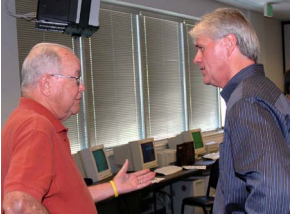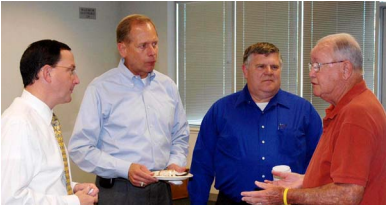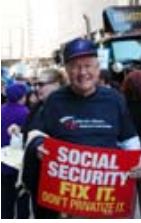It’s an article of faith in the labor movement that progress is possible, that you can make things better, that it’s worth the fight.

Jack Hill, left, discusses retirees’ plight with thenPG&E President Bill Morrow.
Local 1245 retirees held true to this belief in the years-long battle to get PG&E to pay more toward their medical premiums. They fought the good fight, and no one fought it better or with more tenacity than Jack Hill.
As one of two retirees on the Local 1245 Bargaining Committee, Hill spent the past 18 months in nearly continuous negotiations with PG&E.“We were at Vacaville two or three 3 days a week, almost every week. It was a lot of nights at the Holiday Inn Express there in Vacaville,” Hill recalls.
The Bargaining Committee came together in early 2008 to begin educating itself on the many complex issues that would have to be dealt with in negotiations. And no issue was more complex than medical benefits for retired members.Since 2000, retirees have borne the cost of all increases in medical premiums. And those costs grew with frightening speed, threatening to consume a retiree’s entire pension check. Temporary relief was negotiated in 2003 and 2007 in the form of Retirement Premium Offset Accounts, but as those accounts ran out of money, many retirees were staring into a
financial abyss.
The topic was headed for the bargaining table again in 2008, and Business Manager Tom Dalzell knew that retirees needed a strong presence on the bargaining committee. He tapped two veterans of union negotiations: former Business Manager Perry Zimmerman and Jack Hill.
You only need to look at Hill’s background to see why the union would turn to him in a pinch. He was initiated into Local 1245 in 1966 and within months became a shop steward. Shortly after that he was involved in his first bargaining—an ad hoc committee dealing with Clerical issues. He became the Clericalat-Large representative on the Advisory Council, and in the mid-1970s became a union business representative for twoand-a-half years.
After retiring from PG&E as a Senior Service Rep II in 1987, Hill joined the South Bay Chapter of the newly-organized Local 1245 Retirees Club. He became actively engaged in efforts in the early 1990s to gain improvements in retiree pension checks. He contacted the chairs of 15 chapters of the PSEA, an association of PG&E retirees, and got himself invited to their luncheons.

Jack Hill, right, presses retirees’ concerns with, from left, PG&E
Senior Director of Labor Relations Andy Williams, Director of
Industrial Relations Steve Rayburn and then-Senior Director for
Business Projects Terry Morford.
“I got in my pickup and went to their meetings and asked them to get their mailing lists,” Hill recalls. Then he worked with other members of the Local 1245 Retirees Club to create a mailing to PG&E retirees, asking them to contact PG&E about any problems they were having making ends meet. The result was thousands of post cards to PG&E. The company eventually agreed to a boost in pension payments for retirees.
In the following years, Hill established himself as something of a roaming ambassador for Local 1245 retirees, and for senior citizens in general. He served on the board of directors of the Congress of California Seniors, and as a Vice President of California Alliance for Retired Americans. He resigned those positions when he was named to the PG&E bargaining committee in early 2008.
“I knew it was going to take a whole lot of time on those negotiations. It meant me traveling from San Jose to Vacaville,” Hill said. “I told (the other senior groups) it was more important for me to try to do what I could for the guys at PG&E.” When the retiree Benefits issue couldn’t be wrestled to the ground during General Negotiations, which concluded in the fall of 2008, the union and PG&E returned to the table in January of this year to keep trying.
The obstacles were huge and there were times during the negotiations that agreement seemed impossible. There were skeptics and doubters, and some who insisted on “all or nothing.” But as someone whose bargaining table experience stretches back four decades, Hill knew that you don’t turn your back on an improvement just because it isn’t a perfect solution. Once a package was hammered out at the bargaining table, Hill was back on the stump,
explaining it to the union’s members. Other members of the union’s bargaining committee were out there, too, of course. But none of them were 78 years old. The day the ballots were counted in the Benefits ratification vote, Hill went out to dinner with his wife, Kathy—herself a former IBEW steward. “As soon as we got back from dinner I got on the computer and looked the Local 1245 website and found out what the totals were,” Hill said. “Over 3,000 in favor and just 900 against. I was thrilled to death to see that.”
There will be other fights down the road—justice for working people is a battle that never ends. But as long as there are people like Jack Hill willing to fight the good fight, there’s always hope that things can be made better.
